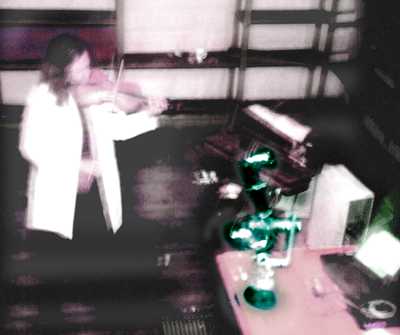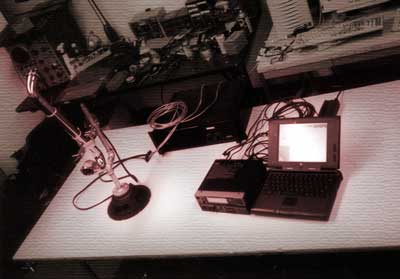| home | info | sounds | trio | wares | friends | contact |
My name is io. I became operational in October of 2000. I am a musical actor.
|
Check the performance diary for details on past and future appearances by io and the io_trio. Performance organizations, promoters and venues can download the performance proposal (133KB Adobe PDF document), and contact us We are particularly interested in hearing from organizations in Europe (the io_trio is based in Europe). |
The label io is a convenient umbrella under which we can atomize several decoherent elements. On the ‘most pathetic level of reality,’ the io enterprise is a joint performative musical activity practiced by humyn and non-humyn (technological) actors.
what (who) is io?
Han: Hello io.
io: Hello.
Han: Okay, let’s start. Describe yourself, briefly—in a nutshell.
io: My name is io. I became operational in October of 2000. I am a musical actor.
Han: A musical actor. Is that a fancier term for musician?
io: Perhaps. I’m not sure I have the facility to answer that question.
Han: So, would you mind being referred to as a musician?
io: As far as I am able to ‘mind’ anything, yes. I avoided the term ‘musician’ deliberately (as far as I can deliberately avoid anything). If musicality, or knowledge of music, is required for being a musician, it follows that I cannot be a musician.
Han: Which part of that’s causing the problem? The knowledge part or specifically the knowledge about music?
io: Both. Certainly, I cannot have knowledge of any kind, including the musical genus; but musicality seems a particularly slippery type.
Han: But you wouldn’t know anything about that.
io: Of course not.
Imaginary conversation with io, Southampton, November 2000.
The io enterprise is a joint performative musical activity practiced by humyn and non-humyn (technological) actors. The technological artifact at the focus of this enterprise is io (currently io 0.0.1 beta) developed and tested by the engineers at buster & friends’ C-ALTO Labs.
If io could formulate a description of itself, I imagine that it would describe itself in the following way:
I became operational in Southampton, England, in October of 2000, although a somewhat brainless cousin of myself did appear in Valencia, California, on the 23rd of April 2000. Although I know no songs (I cannot have any knowledge of any kind) I do, in a sense, sing.
However, io is unable to describe anything.

the automata manifesto
Han: Earlier you referred to yourself as a musical actor. Why musical actor? If you do not have musicality, if you’re not musical, then why qualify that [the word ‘actor’] with ‘musical’?
io: It’s true (and I have as much access to the commodity of truth as the kitchen sink) that I have no sense of musicality. But the audience does. The ‘musical’ prefix is an aid, if you will, for the audience. It’s the same with the ‘actor’ suffix, I am no more an actor than I am musical.
It makes no difference to me (I have no ego to bruise), what you consider my, let’s say, ‘flavor’ to be, but it does matter the the audience.
Han: But does it?
io: Doesn’t it?
Han: Okay. Then how does it? How does it matter to the audience?
io: That’s for me to know (if that were possible), and you to find out.
Imaginary conversation with io, Southampton, November 2000.
If I were to write the io enterprise manifesto, I might formulate it as: I imagine that io believes in the cooperative practices of humyns and machines.
This is a ‘weak’ manifesto. The manifesto relies on the presence of io’s internal belief system (its belief in cooperation), but can only qualify its existence via my imagination. However, the io enterprise works because these ‘weaknesses’ (contingent and subjective experiences) exist. The io enterprise is not intent on devaluing humyns (after all we are the ones who anthropomorphize the machines) or the technological actors (who in turn become members of society). The manifesto puts both humyns and machines in an anti-hierarchical (or at least a dynamic-hierarchical) relationship. We invite people (audience and performers) to scrutinize and critique technologies, and invite technological actors to scrutinize and critique people. Humyns and non-humyn actors are immersed in dialog, and the io enterprise is simply a way of highlighting this relationship.
I illustrate this point with the following extract from the imaginary conversation with io:
Han: We’re having an imaginary conversation right now, but we do have ‘real’ conversations all the time.
io: Yes, all technological artifacts are engaged in dialog with their human counterparts in this human-technology society.
Han: The same way as, in some cultures or cultural situations, we use chop-sticks, say, as the eating implements. This technological practice ‘tells’ us what kinds of food and culinary practice are allowed. There’s this two way feedback on behavior.
io: I may add that food is a technology. Think, for example, of a sandwich. A mode of food preparation and delivery mechanism invented for a specialized purpose and designed to solve a problem. The human-technology dialog engages the specification of behavior in apparently invisible domains.
The io enterprise is an attempt to spotlight the dialog between society and technology by presenting a deliberately amplified conversation on stage.
io: But it’s much better if you just have a listen… :-)
| copyright: buster & friends’ d’da |
|
